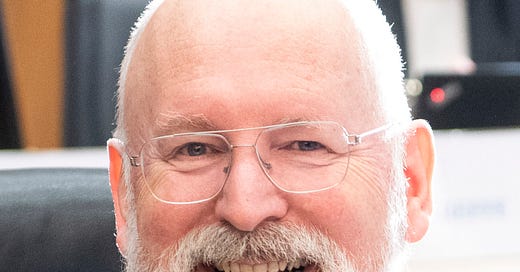Wanted: great leaders in times of turmoil
The West needs to rekindle the values our forebears fought and died for
“In extraordinary times, we need extraordinary leaders.”
So said the leader of the Dutch Labour Party, Frans Timmermans, in this year’s Churchill speech in Zurich, given every year to commemorate Winston Churchill’s address in that city in 1946.
Britain’s wartime leader laid out his vision for a United States of Europe, arguing that an invigorated continent could arise from the devastation of the Second World War, based on Franco-German cooperation against the looming threat of Soviet antagonism.
Timmermans may not have been as spell-binding as the great orator he was commemorating but the speech was prescient and deserves a wider audience.
It was a remarkable address for a social democrat. Timmermans offered a clear-eyed view of Europe he argued is already “in the early stages of a war”.
His oration should be required viewing in Ottawa, where naivete and wishful thinking prevail.
Timmermans, a former Dutch foreign minister, said we can no longer afford leaders who lull citizens into a false sense of security. “We need leadership that has the ability to imagine what could happen in the worst case and prepare to avert it.”
He said for all practical purposes, the West is in the early stages of a war, complicated by disinformation, by a weaponized social media environment that divides democracies and by great powers who are all armed with nuclear weapons.
“It requires the courage and heart to stand up and defend our rule of law, human rights and democracy against adversaries who have already decided to fight us,” he said.

Vladimir Putin is waging war against all liberal democracies in Europe, Timmermans said. “If anyone has illusions he would not act in a covert, and perhaps even open, military way against us, they should think again. The only way to bring about peace is by making sure he cannot win by giving more support to Ukraine.”
Putin’s plans to consolidate and then restore the Russian Empire were clear from the outset because he spoke about them openly, Timmermans said. “The historic mistake of the West was to take them seriously but not literally, all too happy that he brought stability to a nation shaken by an identity crisis, economic and social turmoil and a loss of sense of purpose….(But) autocrats are always very clear about their goals. You should not only take them seriously but literally as well.”
The response requires a stronger NATO defence capability. “The EU is coming to see that the price of outsourcing one’s foreign and security policy may be too high. Free-ridership starts out cheaply but can come back with a damaging surcharge,” he said.
“One cannot commit to an alliance or union, enjoy its security and riches, yet…close the curtains when reality knocks at the door.”
Timmermans call for extraordinary leadership goes beyond taking a more combative approach to authoritarianism. He also argued the case for the parties of the centre right and centre left to become attractive to voters again, in the face of far-right populists who often sympathize with authoritarians.
He said politicians like Hungary’s Viktor Orbán and Donald Trump use hate speech to pin the blame on “the other” - foreigners but also the media, academics, doctors and teachers.
“It is a playbook that taps into the veins of fear and hate…Political differences between left and right are part and parcel of politics….But there was always a common baseline. Certain boundaries were not crossed, such as respect for the rule of law, for facts, for our fundamental freedoms. But that has changed - parties that used to belong to the centre are now working closely with the far right. We have a collective responsibility, whether from the left or right, to strengthen the centre. The centre needs to hold and become stronger again,” he said.
To do that, leaders need to move beyond pocket-book issues.
“We’ve turned citizens into consumers. We need to turn them back into citizens. That is essentially our main task.”
That can be done by rekindling critical thinking, and the knowledge of history, and by avoiding the trap of relativism.
“The truth is morality never lies in the middle. There is right, there is wrong and we have to spell it out and never back down. Our duty is to rekindle the values our forebears fought and sacrificed and died for,” he said.
Churchill himself could not have said it better.






The dilemma for The West:
1) great captains don’t captain sinking ships
2) the best poker player in the world with a bad hand will still lose (The West has a bad hand at this hour)
The West needs systemic change and that is via unification, but we are not ready for that yet. Hopefully WW3 — which has started for anyone paying attention — will be the final stages of nationalism (which always leads to fragmentation and wars by its inherent design).
Excellent article, John
I agree with his argument but fearful we as a society are not up to the challenge